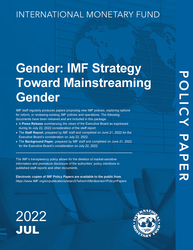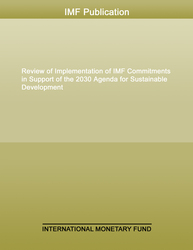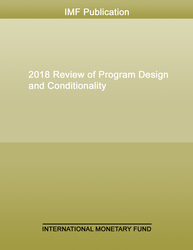
IMF Strategy Toward Mainstreaming Gender
On July 22, 2022, the Executive Board of the International Monetary Fund (IMF) approved the IMF’s first Strategy toward Mainstreaming Gender into the IMF’s core activities.
READ MORE...
Volume/Issue:
Volume 2022
Issue 037
Publication date: July 2022
ISBN: 9798400216602
$5.00
Add to Cart by clicking price of the language and format you'd like to purchase
Available Languages and Formats
| English |
Prices in red indicate formats that are not yet available but are forthcoming.
Topics covered in this book
This title contains information about the following subjects.
Click on a subject if you would like to see other titles with the same subjects.
Money and Monetary Policy , Political Economy , Gender Studies , policy advice , policy analysis , gender policy objective , IMF report , IMF's mandate , policy priority , Gender inequality , Women , Gender diversity , Gender budgeting , Global , Middle East and Central Asia , Central Asia , Sub-Saharan Africa , East Asia
Summary
On July 22, 2022, the Executive Board of the International Monetary Fund (IMF) approved the IMF’s first Strategy toward Mainstreaming Gender into the IMF’s core activities. Mainstreaming gender at the IMF starts with the recognition that reducing gender disparities goes hand-in-hand with higher economic growth, greater economic stability and resilience, and lower income inequality. At the same time, economic and financial policies can exacerbate or narrow gender disparities. Well-designed macroeconomic, structural, and financial policies can support efficient and inclusive outcomes and equitably benefit women, girls, and the society in general. The strategy lays out how the IMF can help its member countries address gender disparities in the context of carrying out its core functions—surveillance, lending, and capacity development. The strategy comprises four key pillars: first, gender-disaggregated data collection and development of modeling tools to enable staff to conduct policy analysis; second, a robust governance framework for an evenhanded approach across members based on the macro-criticality of gender; third, strengthening collaboration with external partners to benefit from knowledge sharing and peer learning, leverage complementarities, and maximize the impact on the ground; and fourth, the efficient use of resources allocated to gender by putting in place a central unit for realizing scale economies and supporting country teams.
Copyright © 2010 - 2026
Powered by:
AIDC



